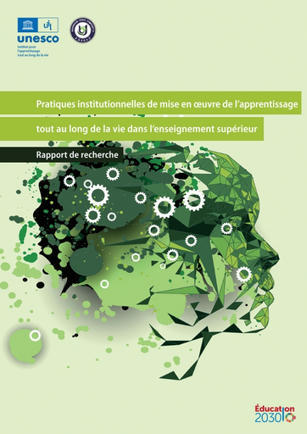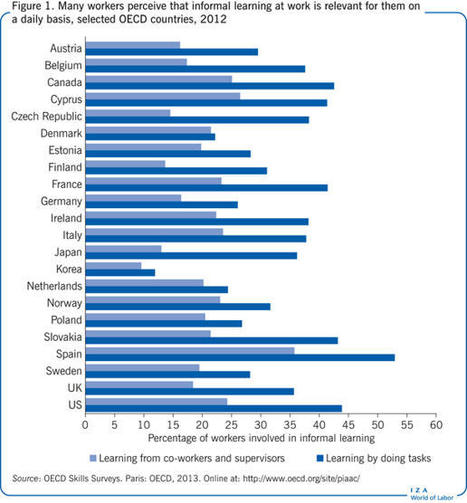 Your new post is loading...
 Your new post is loading...
Les établissements d’enseignement supérieur sont des acteurs clés dans la promotion de l’apprentissage tout au long de la vie (ATLV ). En offrant une variété de programmes éducatifs selon différentes modalités, ils répondent aux divers besoins et intérêts des apprenants. En établissant des parcours d’apprentissage flexibles, ils contribuent à assurer la continuité de l’apprentissage tout au long de la vie. Et en maintenant une interaction étroite avec le secteur privé et les communautés locales, ils concourent à un enseignement et à une recherche utiles au niveau de la société, remplissant ainsi une fonction sociale importante. Ce rapport de recherche présente six études de cas d’universités de différentes régions du monde et offre un aperçu de la mise en œuvre pratique de l’apprentissage tout au long de la vie dans le contexte de l’enseignement supérieur. Il examine les réglementations et les cadres stratégiques qui soutiennent l’engagement des universités en faveur de l’apprentissage tout au long de la vie, décrit la manière dont elles répondent aux nouvelles demandes d’apprentissage et fournit des exemples de programmes et d’initiatives spécifiques qui promeuvent l’ATLV. Le rapport examine également les défis auxquels ces établissements sont confrontés et la manière dont ils les relèvent.Les études de cas ont été élaborées dans le cadre d’un projet de recherche conjoint entre l’Institut de l’UNESCO pour l’apprentissage tout au long de la vie et l’Université ouverte de Shanghai sur la contribution des établissements d’enseignement supérieur à l’apprentissage tout au long de la vie. Il est publié en même temps que les résultats d’une enquête internationale sur ce sujet (UIL et SOU, 2023) et complète les données quantitatives de cette enquête par des recherches qualitatives pertinentes.Ce rapport constitue une ressource précieuse pour les décideurs politiques, les responsables de l’enseignement supérieur, les éducateurs et les autres parties prenantes engagées dans la promotion de l’apprentissage tout au long de la vie. Les résultats présentés dans ce rapport se veulent être une source d’inspiration pour élargir et enrichir la contribution des établissements d’enseignement supérieur à l’apprentissage tout au long de la vie afin de mieux servir les communautés et les apprenants.
Via Canadian Vocational Association / Association canadienne de la formation professionnelle
Tutors International today issued a comment that highlights the transformative impact of personalised learning, emphasising its role in empowering students to go beyond traditional styles of classroom learning to push educational boundaries and become confident, lifelong learners.
OXFORD, England, March 13, 2024 /PRNewswire/ -- In a recent statement, Tutors International, a leading provider of bespoke tutoring services, has shed light on the significant advantages of personalised learning in fostering academic success and personal growth among students. The conventional one-size-fits-all approach of classroom education, while foundational, often misses the mark in catering to the individual needs and learning styles of each student. Personalised learning, particularly through private tutoring, presents a paradigm shift that recognises and nurtures the unique potential within every learner.
Via Canadian Vocational Association / Association canadienne de la formation professionnelle
|

|
Rescooped by
juandoming
from gpmt
|
Elevator pitch
Although early human capital theory recognized the relevance of workers’ experience, its focus was on education and formal training. More recent studies show that much of the performance of newly hired workers is driven by learning by doing or learning from peers or supervisors in the workplace. Descriptive data show that workers learn a lot from the various tasks they perform on the job. Informal learning at work seems to be relevant for all age groups, although it is more meaningful for younger workers’ performance. Informal learning is far more important for workers’ human capital development than formal training courses.
Key findings
Pros
Informal learning is more important to workers’ performance than formal training.
Learning by doing is often an automatic byproduct of productive work.
Informal learning is highly important for workers with temporary contracts.
New hires have a steep performance increase in their first year of employment.
Knowledge spillovers between peers in the workplace contribute to firm productivity.
Cons
Skills acquired through informal learning are less observable by other employers when compared to skills acquired through formal training.
Informal learning involves costs when less proficient workers are less productive in their jobs.
Most firms do not have adequate human resource management strategies to optimize informal learning in the workplace.
The causal effects of informal learning on worker performance are still unclear.
The economic literature on informal learning is underdeveloped.
Author's main message
Steep performance increases among new hires and the large share of work time in which workers perform tasks that impart new skills indicate that informal learning is the main driver of human capital development in the workplace. Knowledge spillovers among co-workers are also an important part of informal learning. Rapidly changing skill demands and rising retirement ages make informal learning even more important for workers’ employability throughout their work life. However, policies still tend to emphasize education and formal training, and most firms dedicate insufficient efforts on optimizing the gains from informal learning at work.
Via Canadian Vocational Association / Association canadienne de la formation professionnelle, LGA, michel verstrepen
In this series of posts for teachonline, we explore the possible, probable and preferred futures of higher education in Canada. In this post we examine the key issues that must be addressed, focusing attention on the need for a comprehensive rethink of the eco-system. Just dealing with one issue (such as funding or curricula) without dealing with the others would have unintended consequences for any institution. Colleges, universities and Indigenous institutes are actively exploring options and are beginning to address these complex, important issues.
These 15 challenges will shape the future of higher education in Canada:
Indigenization – There are three issues at play here.
What higher education can do to promote and embed the idea that we are all treaty people (Truth and Reconciliation)
How more Indigenous learners can succeed in higher education (there is a strong link between these issues and that of decolonialization of the curriculum)
Whether established, dedicated Indigenous institutions are adequately supported and enabled to thrive
Funding and support for teaching and learning and assessment – Without a change in funding and support for teaching, learning and assessment, the work of colleges and universities is fiscally unsustainable. Many institutions are currently vulnerable to modest reductions in the enrolment of international students. This may require a rethink at a fundamental level of funding models and shared services.
Precarity of the instructor class – The number of tenured and tenure-track (university) or permanent instructor (college) positions has been steadily declining. About 60% of all teaching in higher education in Canada is undertaken by sessional instructors (gig workers) and that number is rising. This links to issues of quality and training as well as to the underfunding of Canada’s higher education system. The situation is similar for non-academic staff at our institutions.
Growing demand raises issues of capacity – It’s uncertain how each province will cope with a significant increase in demand from domestic students between now and 2028.
Adding new institutions – If new institutions are created, it’s unclear what the implicit design for learning assumptions will be.
Growth funding for existing institutions – If growth funding occurs, it’ll be vital to figure out the design for learning assumptions and how sustainable the funding will be. Some of the smaller institutions, often located in rural or northern communities, would benefit from investment and growth if this funding was sustainable — otherwise, growth may make them more vulnerable.
The role of the private sector (both private colleges and private universities) – Peering into the future means exploring what kind of public-private partnerships might be created.
The role of hybrid and online and distance learning in designs for growth – It is yet to be determined whether growth will be based on a significant expansion of hybrid and online and distance learning or on expanding classroom-based learning.
The role of AI in the expansion of access – It’s possible that some jurisdictions may experiment with an AI-based institution offering courses and programs leading to certificates, Red Seal certification, diplomas and/or degrees.
Purpose and plans – Governments have been shifting the purpose and focus of the work of colleges, Indigenous institutes and universities toward meeting labour market pressures and demands. Although some modest impact can be seen in very specific areas, the skills gap is now worse than it was when this pressure began, which may add new purpose and pressures on higher education.
Work-integrated learning – 40% of university students and 60% of college students in Canada currently undertake work-integrated learning in some form during their studies. How this develops and grows is vital.
New curricula – Given the changes taking place in the nature of work, the deployment of technology and new fields of work (e.g., new forms of construction, new approaches to health through genetics) institutions face new curricular challenges. What’s unclear is whether new programs of study will displace existing ones, and how fast institutions can respond to emerging opportunities given declining funding and increasing government control.
Lack of faculty development and professional learning – As became clear in the pandemic, faculty skills in instructional design, reimagining assessment and the effective design of engaged and authentic learning need upgrading.
Imagineering and innovation – In highly unionized environments, an important consideration is how creative institutions and leadership can be. It’s also important to examine how much appetite exists for significant change.
Risk management – Willingness to take risks and preparedness for adverse events (e.g., forest fires, floods, natural disasters) are vital considerations for leaders and institutions.
In responding to these issues, institutions will need to refocus their purpose, core activities, business processes and relationships within and beyond their communities. It is a challenging task but an important one.
Tools and Trends
Insights Into the Future and Promise of Online Learning
Via Canadian Vocational Association / Association canadienne de la formation professionnelle
|



 Your new post is loading...
Your new post is loading...










